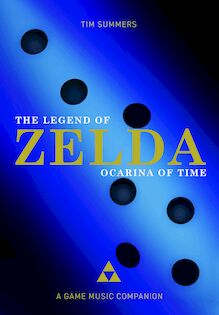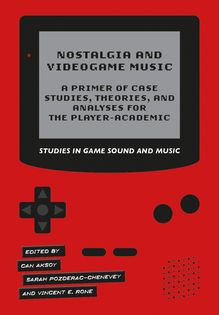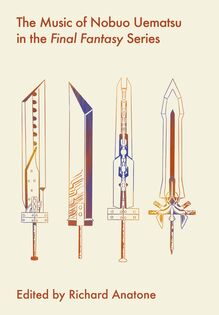-
 Univers
Univers
-
 Ebooks
Ebooks
-
 Livres audio
Livres audio
-
 Presse
Presse
-
 Podcasts
Podcasts
-
 BD
BD
-
 Documents
Documents
-
- Cours
- Révisions
- Ressources pédagogiques
- Sciences de l’éducation
- Manuels scolaires
- Langues
- Travaux de classe
- Annales de BEP
- Etudes supérieures
- Maternelle et primaire
- Fiches de lecture
- Orientation scolaire
- Méthodologie
- Corrigés de devoir
- Annales d’examens et concours
- Annales du bac
- Annales du brevet
- Rapports de stage
La lecture à portée de main
Vous pourrez modifier la taille du texte de cet ouvrage
Découvre YouScribe en t'inscrivant gratuitement
Je m'inscrisDécouvre YouScribe en t'inscrivant gratuitement
Je m'inscrisEn savoir plus
Vous pourrez modifier la taille du texte de cet ouvrage
En savoir plus

Description
This book, the first multi-disciplinary study of nostalgia and videogame music, allows readers to understand the relationships and memories they often form around games, and music is central to this process. The quest into the past begins with this book, a map that leads to the intersection between nostalgia and videogame music.
Informed by research on musicology and memory as well as practices of gaming culture the edited volume discusses different forms of nostalgia, how video games display their relation to those and in what ways theoretically self-conscious positions can be found in games. The perspectives of the new discipline ludmusicology provide the broader framework for this project.
This significant new book focuses on an important topic that has not been sufficiently addressed in the field and is clear in its contribution to ludomusicology.
An important scholarly addition to the field of ludomusicology, with potential appeal to undergraduate and graduate scholars in many related fields due to its inherent interdisciplinarity, including musicology more broadly, game studies and games design, film studies, as well as cultural and media studies. It could also appeal to practitioners, particularly those nostalgic and self-reflexive artists who already engage in nostalgic practice (chiptune musicians, for instance). Also to those researching and studying in the fields of memory studies and cultural studies.
Readership will include researchers, educators, practitioners, undergraduate and graduate students, fans and game players.
Dedication and Acknowledgments
Introduction – Vincent E. Rone
PART 1: ARTICULATING NOSTALGIA AND VIDEOGAME MUSIC
1. A Player’s Guide to the Psychology of Nostalgia and Videogame Music – Michael Vitalino and Vincent E. Rone
2. And the Music Keeps on Playing: Nostalgia in Paraludical Videogame Music Consumption – Sebastian Diaz-Gasca
PART 2: OBJECTIFYING NOSTALGIA AND VIDEOGAME MUSIC
3. My Childhood Is in Your Hands: Videogame Concerts as Commodified and Tangible Nostalgic Experiences – Elizabeth Hunt
4. Remembering the Rules: Immersive Nostalgia in Final Fantasy Leitmotifs – Can Aksoy
5. The Sounds of 8-Bit Nostalgia: The Resurgence of Chiptune Music in Contemporary Film-Based Videogames –Jonathan Waxman
PART 3: SUBJECTIFYING NOSTALGIA AND VIDEOGAME MUSIC
6. A Link between Worlds: Nostalgia and Liminality in Musical Covers of The Legend of Zelda – Alec Nunes
7. You Unlock This Game with the Key of Imagination: The Twilight Zone: The Game (2014), Musical Parody, and the Sound of Nostalgia – Reba A. Wissner
8. “This Game Stinks”: Musical Parody and Nostalgia in EarthBound – Justin Sextro
PART 4: CONFRONTING NOSTALGIA AND VIDEOGAME MUSIC
9. Playing Music Videos: Three Case Studies of Interaction between Performing Videogames and Remembering Music Videos – Brent Ferguson and T. J. Laws-Nicola
10. Remembering Tomorrow: Music and Nostalgia in Fallout’s Retro-Future – Jessica Kizzire
11. Confronting Nostalgia for Racism in American Popular Music via BioShock Infinite – Sarah Pozderac-Chenevey
Notes on Contributors
Index
Sujets
Informations
| Publié par | Intellect Books |
| Date de parution | 29 mars 2022 |
| Nombre de lectures | 0 |
| EAN13 | 9781789385533 |
| Langue | English |
Informations légales : prix de location à la page 0,1500€. Cette information est donnée uniquement à titre indicatif conformément à la législation en vigueur.
Extrait
Nostalgia and Videogame Music
Nostalgia and Videogame Music
A Primer of Case Studies, Theories, and Analyses for the Player-Academic
EDITED BY
Can Aksoy, Sarah Pozderac-Chenevey, and Vincent E. Rone
First published in the UK in 2022 by
Intellect, The Mill, Parnall Road, Fishponds, Bristol, BS16 3JG, UK
First published in the USA in 2022 by
Intellect, The University of Chicago Press, 1427 E. 60th Street, Chicago, IL 60637, USA
Copyright 2022 Intellect Ltd
All rights reserved. No part of this publication may be reproduced, stored in a retrieval system, or transmitted, in any form or by any means, electronic, mechanical, photocopying, recording, or otherwise, without written permission.
A catalogue record for this book is available from the British Library.
Copy editor: MPS Limited
Cover designer: Aleksandra Szumlas
Production manager: Laura Christopher
Typesetter: MPS Limited
Print ISBN (h/bk) 978-1-78938-551-9
Print ISBN (p/bk) 978-1-78938-585-4
ePDF ISBN 978-1-78938-552-6
ePUB ISBN 978-1-78938-553-3
To find out about all our publications, please visit our website.
There you can subscribe to our e-newsletter, browse or download our current catalogue and buy any titles that are in print.
www.intellectbooks.com
This is a peer-reviewed publication.
Contents
Dedication and Acknowledgments
Introduction
Vincent E. Rone
PART 1: ARTICULATING NOSTALGIA AND VIDEOGAME MUSIC
1. A Player s Guide to the Psychology of Nostalgia and Videogame Music
Michael Vitalino and Vincent E. Rone
2. And the Music Keeps on Playing: Nostalgia in Paraludical Videogame Music Consumption
Sebastian Diaz-Gasca
PART 2: OBJECTIFYING NOSTALGIA AND VIDEOGAME MUSIC
3. My Childhood Is in Your Hands: Videogame Concerts as Commodified and Tangible Nostalgic Experiences
Elizabeth Hunt
4. Remembering the Rules: Immersive Nostalgia in Final Fantasy Leitmotifs
Can Aksoy
5. The Sounds of 8-Bit Nostalgia: The Resurgence of Chiptune Music in Contemporary Film-Based Videogames
Jonathan Waxman
PART 3: SUBJECTIFYING NOSTALGIA AND VIDEOGAME MUSIC
6. A Link between Worlds: Nostalgia and Liminality in Musical Covers of The Legend of Zelda
Alec Nunes
7. You Unlock This Game with the Key of Imagination: The Twilight Zone: The Game (2014), Musical Parody, and the Sound of Nostalgia
Reba A. Wissner
8. This Game Stinks : Musical Parody and Nostalgia in EarthBound
Justin Sextro
PART 4: CONFRONTING NOSTALGIA AND VIDEOGAME MUSIC
9. Playing Music Videos: Three Case Studies of Interaction between Performing Videogames and Remembering Music Videos
Brent Ferguson and T. J. Laws-Nicola
10. Remembering Tomorrow: Music and Nostalgia in Fallout s Retro-Future
Jessica Kizzire
11. Confronting Nostalgia for Racism in American Popular Music via BioShock Infinite
Sarah Pozderac-Chenevey
Notes on Contributors
Index
Dedication and Acknowledgments
To my sister, Stacey E. Perrone, the first person I played videogames with.
-Vin
To Aur lie, my Family, and everyone else who understands that gaming is high art.
-Can
To Amelia and Naomi.
-SPC
Vin: I have endless admiration and gratitude for Tim Summers, Will Gibbons, and Steven Reale for their advice, encouragement, and help getting this project rolling-we hope to do you and the field proud. Jelena Stanovnik, Laura Christopher, and the Intellect staff were exceptionally hospitable and courageous for investing in and supporting this project, especially through the throes of the COVID-19 pandemic. To all the authors involved in this project, thank you for your flexibility and trust. Thanks to my dear frenemy Michael Vitalino for collaborating with me on our chapter and for reading other drafts when you did not have to. I learned a lot from our writing together. To Andrew and my Godson AJ Bucci for lending me their encyclopedic knowledge of videogames-I knew those hours playing were not wasted! My beloved nieces Emma and Ava rekindled my love for videogames. Thank you for spending time with your crazy uncle playing Zelda until we could not see straight (we'll get Rocco started soon!). Our time together ultimately led to this book. To Vincent Sr., Margaret, Stacey, and Susan for their love and patience listening to me talk about this topic as if they were as interested in it as much as I. Finally, Can and Sarah believed in this project enough to join me on this adventure. You both kept me sane and never ceased to teach me things every time we spoke. We make a great team, and it would not have been possible without you two. Thank you so much.
Can: I want to first thank my wife Aur lie Chevant-Aksoy, who provided invaluable, patient support as an editor, muse for good ideas, and creator of concrete phrasing for abstract concepts. I also thank my parents, Asuman and Ercument Aksoy, who are delighted that buying me Final Fantasy VII as a child has resulted in academic research. Finally, I want to express gratitude to my co-editors Vincent and Sarah. It was an absolute privilege to collaborate with both of you and I cannot wait for our next project together.
Sarah: Many thanks to Houghton Library at Harvard University and the New York Public Library for allowing me to use their images in my essay. To the staff at the Jim Crow Museum of Racist Memorabilia, thank you for your work identifying and dismantling racist stereotypes. To the attendees of the very first North American Conference on Video Game Music, thank you for the feedback on the presentation that would eventually result in my essay on BioShock Infinite , and to all the members of the ludo community, thank you for contributing to such an encouraging timbre within our field. I owe a deep debt of gratitude to Diane Dingler, who told me about the racist history of Dan Emmett and Dixie right alongside the theory and technique she taught me during voice and piano lessons in Mount Vernon, OH. To my brothers, Jon and Matt, thank you for being right beside me as I explored scary dungeons and old wells. To Benjamin, my husband, the best teammate I could imagine, thank you for your encouragement, thoughtful discussion, and willingness to aid in videogame footage capture, which have been essential to my research. And finally, to Vin, who suggested this project and brought the three of us editors together, and to Can, who gamely jumped into our field and contributed so much of his experience and insight, thank you-I have learned so much from both of you.
Introduction
My past is not a memory. It s a force at my back. It pushes and steers. I may not always like where it leads me, but like any story, the past needs resolution. What s past is prologue.
-Samus, Metroid: The Other M
A consequence of today s videogame industry is the design of its products pointing to the future and the past simultaneously. Regarding the former, the sophisticated visual graphics of the latest game suggest cutting-edge technology and the drive among companies to develop the next great thing for consumers. The increasing technological sophistication of games allows players to immerse themselves in complex worlds, which can indicate progress and the future. Regarding the latter, anyone familiar with the vast repertoire of videogames knows they provide opportunities to reflect on and even simulate the past. Videogames can recreate visual and aural markers of historical periods, for example. To that point, videogames provide something far deeper for players, sites of nostalgic memory. Players and academics increasingly have become aware of the role nostalgia plays in videogames since at least 2008, noting that our past experiences as players shape our analyses of games. 1 Academic literature thus began to articulate what so many players and fans already knew. That is why, in 2022, it sounds like a no-brainer that videogames can provoke nostalgia. Many games from the early 2000s onward contain allusions and references to their 1980s and 1990s ancestors, suggesting those who grew up playing those earlier videogames have grown into nostalgic adults, the so-called Nintendo Generation of players. More importantly, however, videogames put those who engage with them in a theoretically self-conscious position. Videogames invite fans to tread into academic realms to understand more deeply the relationship between their playing experiences and nostalgia, a crossover that potentially blurs the distinction between players and academics. Videogames thus have entered a postmodern moment in which they display their relationship to nostalgia.
Videogame music, or VGM, plays an essential role in this relationship, and the time is ripe to address it. This book consciously gives a platform for readers who see (or may wish to see) themselves as situated between the player/fan and academic separation I mentioned above. These player-academics do ludomusicology and have an advantageous position to consider the complex relationship between nostalgia and VGM. Such a conversation considers nostalgia as a methodological tool to understand VGM and how the former can result from the latter. Music itself already has a widely recognized ability to provoke a strong longing for the past. For instance, Svetlana Boym, perhaps the voice of nostalgia studies, refers to music as a memorative sign, the permanent accompaniment of nostalgia-its ineffable charm that makes the nostalgic teary-eyed and tongue-tied and often clouds critical reflection on the subject. 2 Psychologist Clay Routledge asserts music increases autobiographical recall, as well as the social and emotional connectedness among those who share music-based nostalgia, and he explains how the emotions inspired by music also influence how people perceive nostalgia. 3 Moreover Sandra Garrido, Jane W. Davidson, and Lauren Istvandity all discuss the concept of the lifetime soundtrack, whereupon people create and curate repertories of music integrated into their memories, interpersonal relationships, and the past. Such works
-
 Univers
Univers
-
 Ebooks
Ebooks
-
 Livres audio
Livres audio
-
 Presse
Presse
-
 Podcasts
Podcasts
-
 BD
BD
-
 Documents
Documents
-
Jeunesse
-
Littérature
-
Ressources professionnelles
-
Santé et bien-être
-
Savoirs
-
Education
-
Loisirs et hobbies
-
Art, musique et cinéma
-
Actualité et débat de société
-
Jeunesse
-
Littérature
-
Ressources professionnelles
-
Santé et bien-être
-
Savoirs
-
Education
-
Loisirs et hobbies
-
Art, musique et cinéma
-
Actualité et débat de société
-
Actualités
-
Lifestyle
-
Presse jeunesse
-
Presse professionnelle
-
Pratique
-
Presse sportive
-
Presse internationale
-
Culture & Médias
-
Action et Aventures
-
Science-fiction et Fantasy
-
Société
-
Jeunesse
-
Littérature
-
Ressources professionnelles
-
Santé et bien-être
-
Savoirs
-
Education
-
Loisirs et hobbies
-
Art, musique et cinéma
-
Actualité et débat de société
- Cours
- Révisions
- Ressources pédagogiques
- Sciences de l’éducation
- Manuels scolaires
- Langues
- Travaux de classe
- Annales de BEP
- Etudes supérieures
- Maternelle et primaire
- Fiches de lecture
- Orientation scolaire
- Méthodologie
- Corrigés de devoir
- Annales d’examens et concours
- Annales du bac
- Annales du brevet
- Rapports de stage








